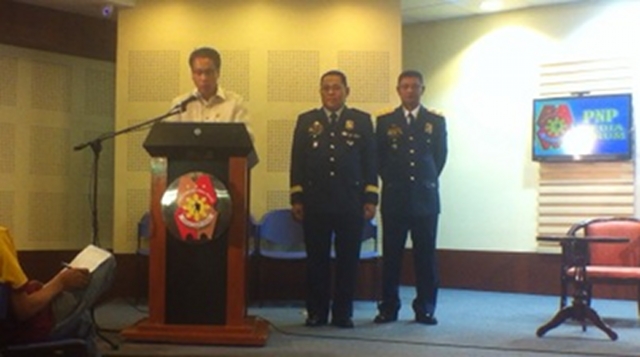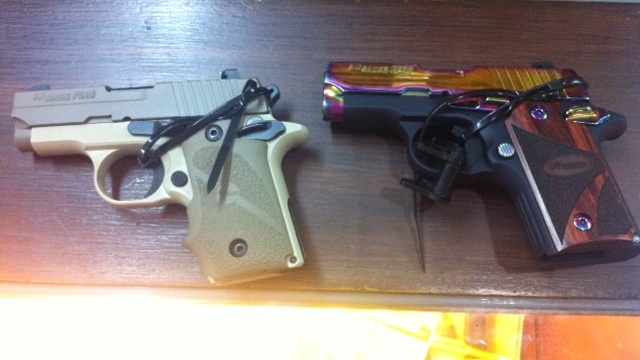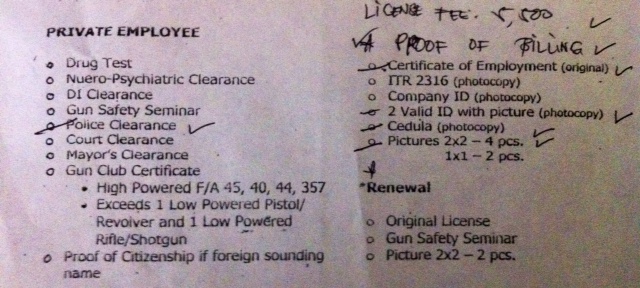SUMMARY
This is AI generated summarization, which may have errors. For context, always refer to the full article.
MANILA, Philippines – I held the pistol delicately, turning it over, examining it.
“Can it kill?” I asked the salesman at a well-known gun store in Metro Manila.
“Yes. The bullet is strong enough,” he said.
It was a .32 caliber, black Beretta Tomcat that could fire 7 rounds. It costs P39,000.
“It’s not like you’ll have 7 attackers at once. That’s all you need,” he said.
I had walked into the store, utterly clueless, only telling the salesman I wanted to buy a gun. Never mind that I had not known anything about guns, or that I had no idea how to fire this one resting on the palm of my hand, or that I didn’t even want to own one! He said I could have it. With a discount even, if I paid in cash.
“Ok,” I said. “I’ll take it.”
He took the gun from me and rested it back on the shelf, handing me a piece of paper in exchange.
“Just submit these requirements to us, so we can apply for a gun license,” he said.
Ticked on the paper were: police clearance, proof of billing, certificate of employment, 2 valid IDs with a picture, ID pictures and a cedula.
Then, an envelope. Inside were application forms for the Philippine National Police (PNP). A form to register for a gun seminar, another for a Directorate for Intelligence clearance, an application to possess firearms, an affidavit saying I have no pending cases against me, an application for a firearm license, and an authorization form prepared by the gun store that I had to sign, allowing them to apply for me.
In all these forms, aside from my basic personal information, it only asked me to sign my signature. Notary Public signatures were to be left blank, as were dates of signing and firearm description.
What tests?
Also listed as requirements were a drug test, neuro-psychiatric clearance, mayor’s clearance and a gun club certificate.
But none of them had checks next to them.
“How about these? Do I need to obtain these?” I asked.
“No, we’ll take care of it. Just pay us a license fee of 5,500 pesos and we’ll take care of all that,” he said.
I paused to clarify.
“You will take care of my drug test? My neuro-psychiatric exam? Meaning you will clear me with the PNP?”
“Yes,” he said. “We will even take care of the safety seminar. Kami na rin po bahala,” he assured me.
I left the store with anything but an assurance.
But I must admit that for a second, I considered buying the gun – just because I could.
Buy as many
Supt Lenbell Fabia is a medium-set man with a pleasant face. He is the second in command at the Firearms and Explosives Office (FEO) licensing division in Camp Crame, headquarters of the Philippine National Police.
When I walked into the FEO on Tuesday afternoon, January 8, the lobby was packed with applicants for licenses. Fabia estimates there are about 200 people a day who apply for renewals of their gun licenses, and about 150 a day who apply for new licenses.
In the Philippines, the first gun license is good for 4 years. After the first 4 years, the license must be renewed every two years. It costs about P360 to P400 a year to own a licensed firearm, depending on the type of gun. A new license for a pistol, for example, which will be good for 4 years, will cost P1,440 – or P360 for each year.
Originally, Filipinos were permitted to own only one long firearm, and one short firearm. But Executive Order (EO) 194 issued under the Estrada government lifted the limits on gun ownership and allowed citizens to own as many guns they want – including assault rifles.
With one license needed for every firearm, Fabia said they rarely deny license applications.
“As long as you meet all the requirements, no problem,” he said.
He named the requirements needed to own a gun – dictating off the top of his head the same list handed to me by the gun store. Drug test, neuro-psychiatric test, police and court clearance, among others.
Fabia said the PNP regulates gun stores and issues them licenses to sell.
“We require them to submit reports on how they sell, whom they sell to and how they sell,” he said.
He added that gun dealerships are given a list of PNP-accredited doctors or drug test and psychiatric centers, and these are the ones they approve, telling me that they usually revoke the licenses of gun stores found to fake documents such as drug tests and clearances.
The store I had visited has been in the business for over 6 decades.
‘A privilege’
When guns are used in a crime, it is the FEO’s job to look into the revocation of a license.
The FEO has a board composed of 7 people who meet whenever there is a complaint or a request for revocation or restoration of a license.
Aside from committing a crime, among the violations that could lead to the withdrawal of a license include firing a gun, lending a firearm, selling a gun, or bringing it in a public or crowded place, even with a permit to carry. Firearms must be concealed at all times, and must be deposited in places like malls.
Fabia also cited an example wherein a license was revoked even when there was no crime committed relating to the gun, pointing to the revocation of Blair Carabuena’s license, a Philip Morris executive who became notorious for hitting an MMDA traffic enforcer. While he did not have the gun with him during the incident, the PNP decided that his actions showed violent tendencies leading to the withdrawal of his license.
Also in September, Allan Bantiles, a parent who reportedly threatened to shoot one of his son’s classmates, had his licenses revoked.
“In the Philippines, owning a gun is not a right, but a privilege. If it is not used properly, the law can take it back,” Fabia said.
All these – responsible gun ownership, basic safety, how to handle guns, even the basics like gun familiarity, assembly and disassembly, how to shoot – are all part of the seminar, said Fabia, that potential gun owners are required to take before citizens are issued a firearm.
These seminars can be taken at the PNP itself or at gun clubs accredited by the PNP.
So what happens then when the gun store “takes care” of the gun safety seminar for their customers? Stores have apparently been doing this for the longest time.
Reforms needed
Speaking about the shooting in Quezon that killed 13, Interior Secretary Manuel “Mar” Roxas on Wednesday, January 9, admitted that recent shooting incidents “show that PNP should further strengthen the regulation of firearms.” (Can a gun ban prevent another Nicole shooting?)
PNP records show there are 1.6 million licensed firearms in the Philippines. A third of all licensed guns belong to the military and police. PNP estimates showed there are nearly 600,000 loose or unregistered firearms.
“We are creating recommendations for the President and we will submit this in the right time. We are reviewing the current regulations in licensing of firearms,” he said.

Roxas also said the ballistics information of all licensed firearms are not easily attainable as of the moment, and that the PNP is studying information on the deficit of over a million firearms that don’t have easily retrievable data, or don’t have a record at all, in order to come up with a program that can early retrieve the ballistics of licensed firearms.
Roxas said they are trying to collect information on exactly how many firearms are out there – both licensed and not – and what types there are.
Past administrations have also issued a series of EOs that provided amnesty for citizens with unlicensed firearms, providing them the option of registering their guns without punishment, but records are still far from complete.
With a reignited debate on gun reform in the country, public officials have acknowledged the need for stricter gun control. But details have still to be ironed out on what exactly these changes are.
I just wish it weren’t so easy to own one. – Rappler.com
Related stories:
Add a comment
How does this make you feel?


.JPG)





There are no comments yet. Add your comment to start the conversation.